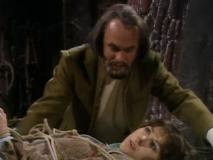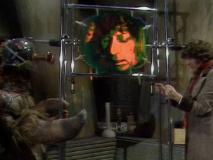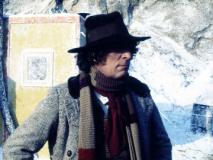Fifty Years of Patrick Troughton
Saturday, 5 November 2016 - Reported by Marcus
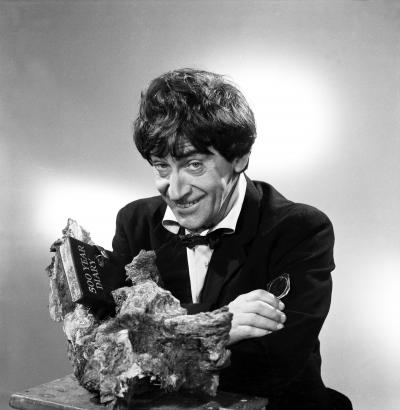
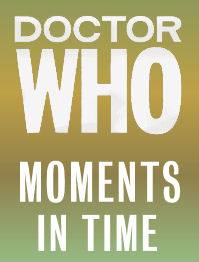 It was fifty years ago today, on Saturday 5th November 1966, that we welcomed Patrick Troughton to the role of The Doctor.
It was fifty years ago today, on Saturday 5th November 1966, that we welcomed Patrick Troughton to the role of The Doctor. The signing of Patrick Troughton was a major coup for the production team. At the time he was one of the best-known actors on British Television, having worked in the medium ever since it restarted after the second World War.
Troughton was born in North London in 1920, the son of a solicitor. His first acting role was at Mill Hill school, later attending the Embassy School of Acting studying under Eileen Thorndike. He won a scholarship to the Leighton Rallius Studios at the John Drew Memorial Theatre on Long Island in New York City.
His acting career was interrupted by war and the ship returning him to England sunk after hitting a mine in the English channel, forcing him to escape by lifeboat. Not put off by the sea he joined the Royal Navy serving with Royal Naval Reserve, earning the 1939-45 Star and the Atlantic Star as well as being mentioned in dispatches.
I was given my own command and sent to Great Yarmouth. I spent the rest of the war picking Americans up out of the drink. It was lovely having your own boat
Troughton made his Television debut in 1947, playing the young Thomas Culpepper in the play The Rose Without a Thorn, a production which starred Richard Hurndall, another actor who would inherit the role of the First Doctor. He found himself particularly suited to Television, where all drama was transmitted live. He relished the large audience the medium could reach, and the majority of his career would now focus on Television and to a lesser extent movies. He was prolific in the medium appearing The Invisible Man, The Old Curiosity Shop, Kidnapped, The Count of Monte Cristo, Ivanhoe, Dial 999, Danger Man, Maigret, Compact, The Scarlet Pimpernel, The Third Man, Crane, Detective, Sherlock Holmes, No Hiding Place, The Saint, Armchair Theatre, The Wednesday Play, Z-Cars, Adam Adamant Lives!, A Tale of Two Cities, Smuggler's Bay, The Splendid Spur, The Naked Lady, The Scarf, The Rebel Heiress, Benbow and the Angels, Clementina, The Royalty and Softly, Softly. In 1953 he became Television's first Robin Hood, becoming a tea-time favorite for the nation's children and in 1960 made a huge impression on Sunday afternoons as Paul of Tarsus.
Dispite his huge body of work, Troughton was not the only choice, or indeed the first choice to take over from Hartnell. Brian Blessed, fresh from a leading role in police drama Z-Cars was offered the role, but declined because of scheduling conflicts. Rupert Davies, Valentine Dyall and Michael Hordern were all approached but none wanted to commit to a long-running series.
Troughton was offered the role in June 1966, while working on the Hammer film The Viking Queen. He had doubts about accepting. He himself was a fan of Doctor Who, and had watched every single Hartnell episode. But he thought the series had probably run its course.
I didn't think it was a particularly good idea of the BBC to replace Billy. I didn't see how anyone could follow him. I thought the difficulties of selling it to the audience, apart from selling it to poor Ben and Polly, were enormous, almost insurmountable.
Troughton was eventually persuaded to take the role and signed the contract for 22 episodes on 2nd August. He initially had the idea of playing the character in heavy make-up, in order to prevent being type-cast, but the look eventually settled on was that of the cosmic hobo. We went up to Bermans, the costumiers, and we just looked through all the old rubbish really. We just got things out of hampers and had a look.
The characterisation was worked out between Troughton and script editor Gerry Davis, who explained. I thought it would be interesting to have a character who never quite says what he means, who, really, uses the intelligence of the people he is with. He knows the answer all the time; if he suggests something he knows the outcome. He is watching, he's really directing, but he doesn't want to show he is directing.
Troughton would hold the role for three years. His success would guarantee the series longevity, and Troughtons place in the Television hall of fame. Sources: Doctor Who Magazine No 78 (1983) Interview by Richard Landen: Fantasy Empire (1986) Interview with John Peel: Interview PanoptiCon VI (1985)The Handbook; The Handbook: The First Doctor – The William Hartnell Years: 1963-1966, David J Howe, Mark Stammers, Stephen James Walker (Doctor Who Books, 1994)
